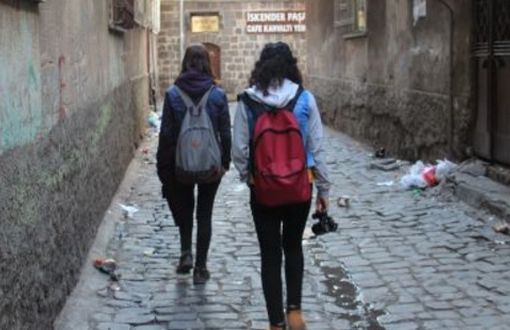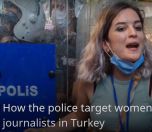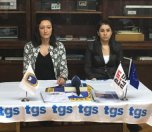Click to read the article in Turkish / Kurdish
The Coalition for Women In Journalism (CFWIJ), a global organization of support for women journalists, has released its first quarterly report for 2021.
Covering the period from January to April, the report has said, "Throughout the first quarter of 2021, CFWIJ documented 348 cases of violence and threats against women journalists around the world."
"In the first quarter of 2021, the total number of cases against women in media increased by 284.8 percent compared to the first quarter of last year," it has noted. "MENA was the most dangerous region for women journalists, with 127 cases, 36.5 percent of the total incidents reported."
The CFWIJ has also shared information about the state of women journalists in Turkey. According to the report, Turkey is the leading country in terms of the attacks and threats faced by women journalists:
"Since the beginning of the year, Turkey has been the leading country for attacks and threats against women journalists. We recorded a total of 114 female journalists who were attacked and threatened since the beginning of 2021. Almost 50 women journalists appeared before the court to fight baseless charges; twenty suffered heavy workplace bullying at the newsrooms; fifteen female journalists were subjected to police violence while covering the news; fourteen were detained; three women journalists were sentenced to prison, and three were expelled. While one journalist was threatened with intimidation, another became the target of racist rhetoric.
Turkey's increasingly autocratic political climate continues to target journalists. The monotonous news published by pro-gov media outlets, under orders from President [and ruling AKP Chair Recep Tayyip] Erdogan, infringes the freedom of expression. Journalists, who are determined to write the truth, are struggling to continue their work."
Report's highlights about TurkeyOther highlights about Turkey are as follows: "The country started 2021 with misogynistic attacks against women by detaining three female journalists covering a protest in the capital city, Ankara. Jinnews reporters Habibe Eren, Öznur Değer, and journalist Eylül Deniz Yaşar were detained with 18 other women who participated in the protest organized by the Ankara Women's Platform. The protestors gathered to decry the disappearance of 22-year-old university student Gülistan Doku over a year ago. The journalists were released after their health examination and testimony were taken. The detained protesters were prosecuted for violating the law on demonstration. "The student protests in Istanbul, the women's movement denouncing Turkey's withdrawal from the Istanbul Convention, and the Covid-induced labor protests challenged female journalists in the field. Many women journalists were subjected to verbal harassment and police violence while doing their job. Most of the detentions we recorded were of women journalists arrested while covering developments on the ground. "In February, students started protesting the approval of Prof. Dr. Melih Bulu— the new rector of Bogaziçi University appointed by the Turkish Presidency. As the events escalated, several journalists were subjected to police violence while following the protests. Elif Akgül, Board Member of The Confederation of Progressive Trade Unions of Turkey (DİSK), was one of those journalists physically assaulted by the police. "Evrensel Newspaper columnist Ayşen Şahin was another journalist who followed and shared the developments of the Boğaziçi protests on her social media account. She was taken into custody from her home at 10:00 PM. Her social media posts were cited as the reason for her arrest, and she was subsequently charged with inciting the public to hatred and hostility. Speaking to the CFWIJ after her detention, Ayşen highlighted the situation women journalists are facing in Turkey, describing the current pressure on journalists as an empire of fear. "Dokuz8Haber reporter Ebrar Başyiğit and Artı Gerçek correspondent Yağmur Kaya were also apprehended while covering the developments of the case against Boğaziçi University students at İstanbul Çağlayan Courthouse. Artı Gerçek's Yağmur Kaya was battered and arrested while covering the police attack. The assault against the journalist went public in a video posted on Twitter. Another reporter from Dokuz8, Fatoş Erdoğan, was also prevented from filming, police yelling, "Getaway, the press is forbidden" before pushing the journalist from the scene. Yağmur and Ebrar were released shortly after their arrest. "At the beginning of April, the tension surrounding the Boğaziçi protests increased with the arrest of two students. On April 1, police intervened in the Boğaziçi University student protests that took place in İstanbul. More than 30 students were detained, and many journalists, including women reporters, were deliberately obstructed and brutally attacked by the police. At least four women journalists at the scene were tear-gassed and beaten. "State incursions and intimidation tactics are not limited to journalists working in the field. Many journalists, male or female, are detained in early morning police raids on their homes. Because of their journalistic coverage, they are either arrested or released conditionally with an imposed travel ban. "On February 5, police intervened in the press briefing of the United Struggle Forces (BMG) establishment, and two female journalists were detained during the public announcement. While Mesopotamia Agency (MA) reporter Rojin Altay was released the next day, reporter Zarife Çamalan from Alınteri Newspaper was held without just cause and denied legal counsel. Zarife was released four days after her detention, despite informing the authorities of her health problems. "Jin News reporter Beritan Canözer was taken into custody on April 5 when police raided her home in Diyarbakır. The reason for Beritan's arrest was not specified and remained confidential. During her detention, Beritan was threatened and mistreated, along with 21 other women who were taken into custody during a police operation. Reportedly, one of the detainees wanted to leave the door open for reasons relating to health concerns. However, the police kept it closed and threatened the women, saying, "If you even try knocking on the door, I will teach you humanity.", on top of depriving the detainees of basic needs. After her four-day detention, Beritan was called to court without prior notice, and the prosecutor requested her arrest. However, after appearing in court, the journalist was released conditionally. Her phone, digital materials, and books were seized by the police during the raid and have yet to be returned. "In Turkey, the CFWIJ monitored and documented the cases of legal harassment against women journalists. At least 50 female journalists have appeared in court since the beginning of the year. Journalists are often prosecuted on terrorism charges for their stories and social media posts. In 2021, three female journalists were sentenced to prison. "Journalist Perihan Kaya was sentenced to one year and three months in prison for spreading terrorist propaganda. At her first hearing, the court found her guilty. Perihan's membership to the Free Journalists Association (ÖGC), social media posts, phone calls with colleagues, and confidential witness statements were taken as evidence. The journalist was accused of being responsible for the KCK organization's Press Area, organizing propaganda, and being a member of an armed terrorist organization. "Mücadele Birliği Newspaper reporter Serpil Ünal and Önsöz Magazine editor-in-chief Songül Yücel were sentenced to one year, six months, and 22 days in prison on the charge of making propaganda for a terrorist organization. The journalists were tried for their social media posts about the Turkish military "Olive Branch" operation in Afrin in January 2018. "One of the significant trials was about imprisoned journalists Şehriban Abi and Nazan Sala. On October 6, 2020, journalists Şehriban and Nazan were detained during the raid on Mesopotamia Agency's Van office. Four days later, they were arrested for reporting about two Kurdish villagers named Servet Turgut and Osman Şiban, who was tortured and thrown from a national army helicopter. One of the victims of the torture, Servet Turgut, died from his injuries on September 30. Both journalists remained behind bars for 175 days. When the first hearing was held in Van on April 2, Şehriban and Nazan were released conditionally. Their trial continues over charges of being members of an armed organization and spreading terrorist propaganda through the press. If convicted, both journalists face a sentence of up to 15 years in prison. "The CFWIJ closely monitored the developments regarding the arrested journalists Şehriban Abi and Nazan Sala. We documented that the journalists were tortured and held in the male ward of the jail, facing deplorable conditions. The journalists endured malicious treatment in prison that violated human rights. During their 14-day quarantine, imposed as part of pandemic precautions, they were held in unhygienic conditions, their basic needs unmet. Despite the cold weather conditions in Van, the journalists were denied the necessities to stay warm. During their four-day detention, the journalists were not allowed to see their lawyers and were therefore unable to prepare their defense." |
(EMK/SD)









